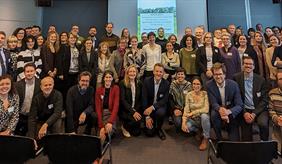19.03.2024

Crises are posing new challenges for agriculture and the food sector worldwide. It is becoming increasingly clear that one-size-fits-all solutions no longer work and that case-specific concepts need to be developed from a variety of approaches. By joining the Agroecology Coalition, the German government aims to promote the conversion of agriculture to sustainable agroecological cultivation methods through policy, knowledge exchange and the provision of financial resources. Depending on regional conditions and requirements, agriculture in Germany and around the world is to be adapted to natural and climatic conditions and cycles, with local experience and the inclusion of practice partners being important building blocks.
The EU is now also promoting this process on the research side with a comprehensive funding measure called AGROECOLOGY, short for “Accelerating Farming Systems Transition: Agroecology Living Labs and Research Infrastructures“. The Partnership started on January 1, 2024 and will have a duration of up to 10 years, with an overall budget up to 300 Million Euro (funded equally be the EU and the countries represented in the measure). On February 28 and 29, the official kick-off took place in Brussels with more than 60 partner institutions from across Europe.
The partnership aims to structure and support a network of living labs and research infrastructures that will accelerate the transition towards agroecology throughout Europe. It will create spaces for long-term, site-specific, multi-stakeholder and real-life experimentation, and provide guidance for research activities on agroecology at the national and European levels.
The focus is on collaboratively developing and on providing ready-to adopt practices that support farmers in understanding and implementing agroecological practices at the scale needed for positive economic, environmental and social impacts.
ZALF is involved with scientists from three working groups in this partnership, which is coordinated by Projektträger Jülich in Germany. ZALF researchers will help in developing standards for data infrastructures that researchers will use to exchange data and results EU-wide, in developing methods to identify and include practice partners, and in developing research methods for living labs.
The goal is that by 2030, the EU research and innovation ecosystem around agroecology will be better connected, so that knowledge of agroecological processes will boost the uptake of agroecology by farmers and the environmental, economic and social performances of farming will be improved.
Further information:
